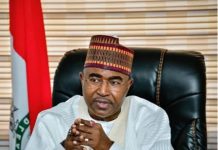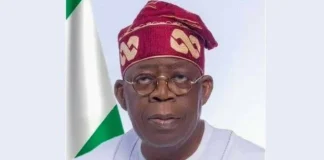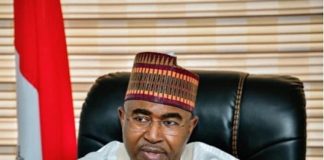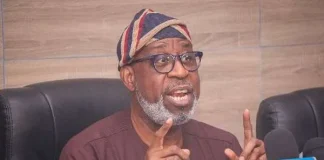🌿 Ruzu Non-Alcoholic Herbal Bitters
Ruzu Non-Alcoholic Herbal Bitters is a natural health supplement specially formulated to:
- ✅ Promote general wellness
- ✅ Detoxify the body
- ✅ Support the treatment of various ailments
Made from a powerful blend of 100% organic and medicinal herbs, Ruzu is completely alcohol-free, making it ideal for:
- 👪 All age groups
- 🌱 Health-conscious individuals
- 🌿 Anyone seeking non-alcoholic herbal remedies
Whether you're looking to boost your vitality, cleanse your system, or support healing the natural way, Ruzu Bitters offers a trusted herbal solution.
The Kogi State Governorship Election Petition Tribunal, sitting in Abuja on Monday, reserved judgment in the petition filed by the Social Democratic Party and its governorship candidate, Murtala Ajaka, against the election victory of Governor Usman Ododo.
Ajaka’s lawyer, Pius Akubo, at today’s proceedings, Ajaka’s lawyer, urged the tribunal to set aside the respondents’ submissions and uphold theirs.
Also, the counsel to the Independent National Electoral Commission (INEC), Kanu Agabi, told the court that their final written address was dated and filed on May 2 as he prayed the tribunal sitting to dismiss Ajaka’s petition.
Likewise, the All Progressives Congress (APC) and Ododo asked the tribunal to dismiss Ajaka’s petition in its entirety for being incompetent and lacking in merit.
Counsel to the respondents, Agabi, Joseph Daudu, and Emmanuel Ukala, while adopting their final written addresses and presenting their arguments against the petitioners, prayed the three-member panel of Justices, led by Justice Ado Birnin-Kudu to dismiss the petition.
Agabi contended that the Appeal Court had decided that if the grounds of a petition are inconsistent with one another and are not consistent with the reliefs, it should be struck out.
He also argued that the evidence of the petitioners were grossly insufficient, citing a Supreme Court decision in a case by Tonye Cole against INEC.
Read also: One chance syndicate terrorising Rivers in police net
“It is our humble submission that your work in the determination of this petition is simplified in recent judgments by the Court of Appeal and Supreme Court.
“It is to the effect that once the evidence called is grossly insufficient, there is no evidence. In that case, the petitioner filed 305 witness depositions but only adopted 40 of them.
“The petitioner, according to the decision, only adopted about 13.1 per cent of the witness depositions. In this case, the depositions adopted represent just about 3.6 per cent of their witness depositions,” Agabi said, adding that the petitioners only called 25 witnesses out of the scores listed.
According to Agabi, in the mathematical calculation of evidence, 3.6 per cent of Ajaka’s witness deposition adopted in the petition amounted to a failure and therefore, ought to be dismissed.
He said the petitioners equally failed to file the witness deposition beforehand in contravention of the Supreme Court’s decision in Obungado’s case.
He argued that the petitioners’ witness who testified about the Bimodal Voter Accreditation System machines, clearly stated that he could not guarantee whether those were the BVAS used.
He further argued that the BVAS machine was tendered against Section 84 of the Evidence Act, as there was no certificate of trustworthiness attached alongside it as required by the law.
“Also, the evidence contained in the BVAS machines fell short of what is required of the law,” he added, describing the case as frivolous as he argued that out of 25, not a single election observer was called.
“Besides, the star witness could not distinguish between what he heard and what he saw when questions were put to him”.
Also, Ododo’s legal representation, Daudu, while adopting his final written address dated and filed on May 1, argued that the petition was statute-barred (filed out of time).
He argued that the action of the petitioners was against Section 122(1) and (2)(a) of the Evidence Act, which empowers the tribunal to take judicial notice of the time of filing, service and response.
Although he clarified that the petitioners responded to their service, Akubo objected to Daudu’s citing of the section describing it as a fresh argument.
Daudu, in response, disagreed with Akubo that he was raising fresh issues after a final written address had been filed.
According to him, if the court found merit in his argument, Akubo had the right to respond because it bordered on issues of remittal procedure.
He also urged the tribunal to dismiss the allegations of forgery against his client, saying it bordered on a pre-election matter, which the apex court had decided in Gbagi’s case against INEC.
Daudu also argued that Section 137 of the Electoral Act cited by the petitioners on allegations of over-voting did not apply in the instant petition.
After taking arguments from all parties, Justice Birnin-Kudu reserved judgment in the petition.
He announced that a date for judgment would be communicated to the parties.
It will be recalled that the tribunal had, on April 25, fixed today for the adoption of final written addresses after the parties closed their case in the matter.
SDP and Ajaka had approached the tribunal to challenge Ododo’s victory in the Nov. 11, 2023, Kogi governorship elections.
If you like what we do, and are ready to uphold solutions journalism, kindly donate to the Ripples Nigeria cause.















